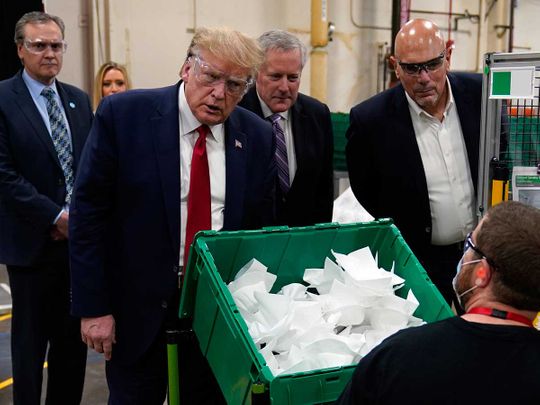
In 2004, “60 Minutes” aired a segment on what it called “virus hunters,” scientists searching for bugs that can leap from animals to humans and cause pandemics. “What worries me the most is that we are going to miss the next emerging disease,” said a scientist named Peter Daszak, describing his fear of a coronavirus “that moves from one part of the planet to another, wiping out people as it moves along.”
In the intervening years, Daszak became president of the EcoHealth Alliance, a non-profit research organisation focused on emerging pandemics. EcoHealth worked with China’s Wuhan Institute of Virology to study coronaviruses in bats that could infect humans, and, as Science magazine put it, “to develop tools that could help researchers create diagnostics, treatments and vaccines for human outbreaks.”
Since 2014, the EcoHealth Alliance has received a grant from the National Institutes of Health, until its funding was abruptly cut two weeks ago.
The reason, as “60 Minutes” reported Sunday evening, was a conspiracy theory spread by Rep. Matt Gaetz, R-Fla., who in March wore a gas mask on the House floor to mock concern about the new coronavirus. On April 14, Gaetz appeared on Tucker Carlson’s Fox News show and claimed that the NIH grant went to the Wuhan Institute, which Gaetz intimated might have been the source of the virus — the institute may have “birthed a monster,” in his words.
This political hit is far from the only way that the Trump administration’s contempt for science has undermined America’s coronavirus response. Conservative antipathy to science is nothing new; Republicans have long denied and denigrated the scientific consensus on issues from stem cell research to climate change
The first of Gaetz’s claims was flatly false, and the second unlikely; the CIA has reportedly found no evidence of a link between the virus and the Wuhan lab. But at a White House briefing a few days later, a reporter from right-wing website Newsmax told President Donald Trump that under Barack Obama, the NIH gave the Wuhan lab a $3.7 million grant. “Why would the US give a grant like that to China?” she asked.
In fact, Trump’s administration had recently renewed EcoHealth’s grant, but Trump didn’t appear to know that. “The Obama administration gave them a grant of $3.7 million?” he asked. Then he said, “We will end that grant very quickly.”
Search for a vaccine
And they did. But ending the grant dealt a blow to efforts to find treatments and a vaccine for the coronavirus. Remdesivir, the antiviral drug that’s shown some promise in COVID-19 patients, was earlier tested against bat viruses EcoHealth discovered. Now the non-profit is facing layoffs.
This political hit is far from the only way that the Trump administration’s contempt for science has undermined America’s coronavirus response. Conservative antipathy to science is nothing new; Republicans have long denied and denigrated the scientific consensus on issues from stem cell research to climate change.
This hostility has several causes, including populist distrust of experts, rejection of information that undermines conservative literalism and efforts by giant corporations to evade regulation.
But it’s grown worse under Trump, with his authoritarian impulse to quash any facts, from inauguration crowd sizes to hurricane paths, that might reflect poorly on him.
Disdain for expertise
Until recently, it seemed as if Trump’s sabotage of efforts to combat climate change would be the most destructive legacy of his disregard for science. But the coronavirus has presented the country with an emergency that only sound science can solve.
That means that the Trump administration’s disdain for expertise, its elevation of slavish loyalty over technical competence, has become a more immediate threat.
Months before this pandemic began, Reuters reported, the Trump administration axed the job of an epidemiologist working for the Centers for Disease Control and Prevention to help detect emerging disease outbreaks.
As the pandemic raged, the administration removed Rick Bright, one of America’s premier experts on vaccine development, from an agency overseeing efforts to develop a coronavirus vaccine.
Last week, Bright filed a whistle-blower complaint claiming he’d suffered retaliation because he resisted “funding potentially dangerous drugs promoted by those with political connections and by the administration itself.” (A federal watchdog agency has called for him to be reinstated pending its investigation.)
Another whistle-blower complaint, filed by a former volunteer on the coronavirus team assembled by Trump’s son-in-law, Jared Kushner, claims the effort has been beset by inexperience and incompetence.
The Associated Press reported on how the White House buried guidance from the CDC on how communities could safely reopen. Now the president is urging Americans to return to work even as the White House itself has proved unable to keep the coronavirus at bay.
According to Axios, Trump has even privately started expressing scepticism of the coronavirus’s death toll, suggesting it’s lower than official statistics say. (Most experts believe the opposite.)
“A senior administration official said he expects the president to begin publicly questioning the death toll as it closes in on his predictions for the final death count and damages him politically,” reported Axios. The Trump administration’s approach to the coronavirus began with denialism, and that’s likely how it will end.
Any progress America makes in fighting COVID-19 will be in spite of its federal government, not because of it. “I am speaking out because to combat this deadly virus, science — not politics or cronyism — has to lead the way,” Bright said when he went public with his complaint in April. Trump won’t let that happen. He’d rather essentially give up on combating it at all.
Michelle Goldberg is an Op-Ed columnist, who writes on politics and ideology.
NYT







